Zigelbaum + Coelho
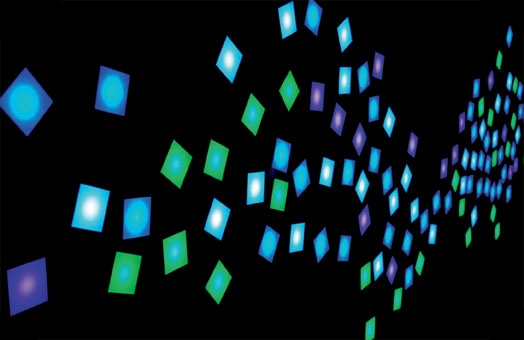
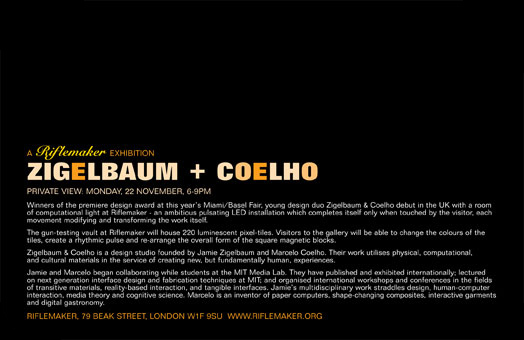
Winners of this year's Design Miami/Basel Designers of the Future award, Zigelbaum + Coelho, present the UK debut of their
computational light installation which steals the pixel from the screen and re-introduces it to the physical world. An ambitious, pulsating LED installation completes itself only when touched by the visitor, each movement modifying and transforming the work itself.
The gun-testing vault at Riflemaker will house 220 luminescent pixel-tiles. Visitors to the gallery will be able to change the colours of the tiles, create a rhythmic pulse and re-arrange the overall form of the square, magnetic blocks.
Zigelbaum & Coelho is a design studio founded by Jamie Zigelbaum and Marcelo Coelho. Their work utilises physical, computational, and cultural materials in the service of creating new, but fundamentally human, experiences.
Jamie and Marcelo began collaborating while students at the MIT Media Lab. They have published and exhibited internationally; lectured on next generation interface design and fabrication techniques at MIT; and organised international workshops and conferences in the fields of transitive materials, reality-based interaction, and tangible interfaces. Jamie's multidisciplinary work straddles design, human-computer interaction, media theory and cognitive science. Marcelo is an inventor of paper computers, shape-changing composites, interactive garments and digital gastronomy.
The gun-testing vault at Riflemaker will house 220 luminescent pixel-tiles. Visitors to the gallery will be able to change the colours of the tiles, create a rhythmic pulse and re-arrange the overall form of the square, magnetic blocks.
Zigelbaum & Coelho is a design studio founded by Jamie Zigelbaum and Marcelo Coelho. Their work utilises physical, computational, and cultural materials in the service of creating new, but fundamentally human, experiences.
Jamie and Marcelo began collaborating while students at the MIT Media Lab. They have published and exhibited internationally; lectured on next generation interface design and fabrication techniques at MIT; and organised international workshops and conferences in the fields of transitive materials, reality-based interaction, and tangible interfaces. Jamie's multidisciplinary work straddles design, human-computer interaction, media theory and cognitive science. Marcelo is an inventor of paper computers, shape-changing composites, interactive garments and digital gastronomy.
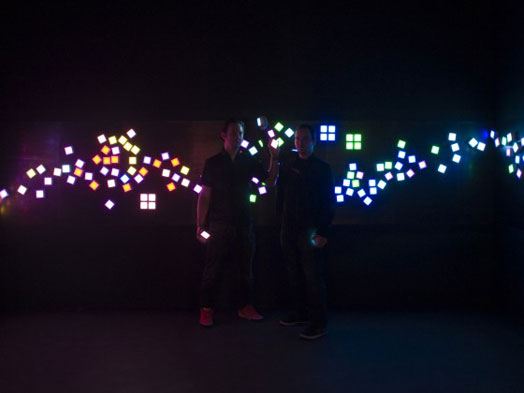
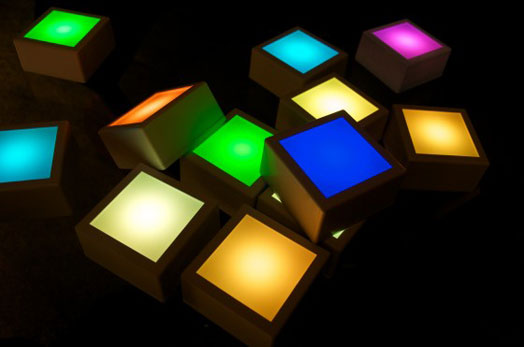
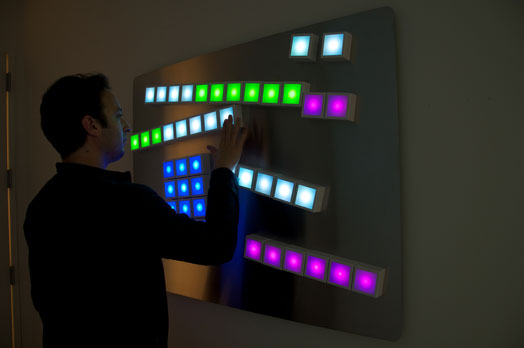
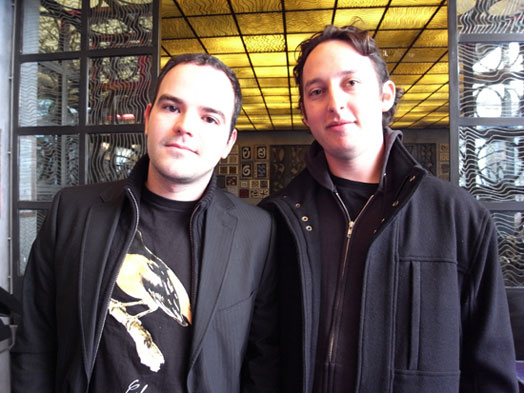
Zigelbaum + Coelho
is a post-industrial design studio founded by Jamie Zigelbaum ( b.1978, Boston, Mass, USA) and Marcelo Coelho ( b.1980, Campinas, Brazil).
Operating at the intersection of design, technology, science, and art, their work utilises physical, computational, and cultural materials in the service of creating new, but fundamentally human, experiences. Jamie and Marcelo began collaborating while students at the MIT Media Lab. They have lectured, published and exhibited internationally.
Jamie Zigelbaum
Jamie Zigelbaum builds and studies next generation computer interfaces, augmented objects, and human experiences. His work is multidisciplinary, straddling design, human-computer interaction, media theory, and cognitive science.
Jamie received a Master of Science degree from the MIT Media Lab in 2008 working in the Tangible Media Group. Before coming to the Media Lab, Jamie received a Bachelor of Arts in 2006 from Tufts University where he majored in Human-Computer Interaction. For his undergraduate thesis he built the Tangible Video Editor (TVE), a physical interface for collaboratively editing video.
Jamie has exhibited and published internationally at human-computer interaction conferences and interactive arts festivals such as TEI, CHI, Ars Electronica, and ISEA. In 2010 he chaired the ACM's international conference on Tangible, Embedded, and Embodied Interaction. He works and lives in Los Angeles.
Marcelo Coelho
Marcelo Coelho is a designer and researcher whose work dwells in the intersection of human-computer interaction, materials science and design. He is an inventor of paper computers, shape changing composites, interactive garments, and edible circuits.
Coelho holds a BFA in Computation Arts, with highest honors, from Concordia University in Montreal, where he was also a Research Partner at XS Labs developing wearable technology and interactive textiles. He is currently based in Cambridge, MA, where he is a PhD candidate at the MIT Media Lab.
His work has been exhibited internationally, at Ars Electronica, Societe des arts technologiques, Gallerie Sequence, Digifest, Dutch Design Week, Collision Collective and Seamless Fashion Show. He has won several grants and awards, including MIT Council for the Arts Grant, VAV production grant, US National Congress on Computational Mechanics Award, Golden Key Visual & Performing Arts Achievement Award, and CHI Best Video Golden Mouse Award.
Academically, Coelho’s research has been widely published in books, popular press and academic conferences such as SIGGRAPH, ISEA, ISWC, Ubicomp, TEI and CHI. He has given numerous classes, workshops and public lectures at MIT, Fordham University, Emily Carr University of Art and Design, The Danish Royal Academy of Fine Arts, Banff New Media Institute and Canada's National Research Council.